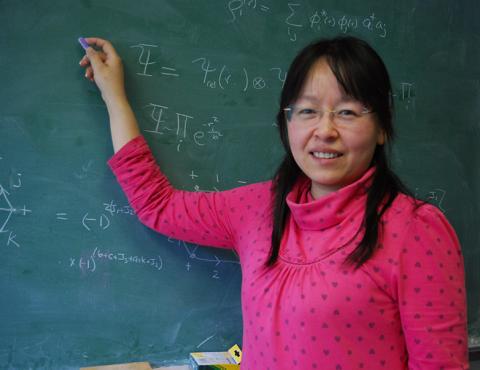
The work of physicists can be daunting for the first-time student, observer or enthusiast. Luckily, there are people like Dr. Wenjun Li who are dedicated to making physics not just understandable, but also interesting, engaging and relevant for students.
Wenjun, a theoretical physicist from Henan Normal University in China, is both a teacher and lifelong learner and currently at TRIUMF as a visiting scientist. While at TRIUMF collaborating with the theory group on her own research, she also plans to learn more about becoming a better teacher. Her year-long visit, which began last August, is sponsored by the China Scholarship Council (CSC) in order to encourage further study and promote academic exchange.
Her experience as a physicist and a teacher plays an important role in the way she approaches her time at TRIUMF. As a researcher, Wenjun is concerned with charged lepton flavour violation processes. Since the discovery of neutrino oscillation, which won the Nobel Prize in physics for 2015, scientists have begun to turn their attention to charged leptons: the electron, the muon and the tau. Charged lepton flavour violations, which are rare but detectable, are expected to be a powerful probe into new physics beyond the Standard Model.
As a teacher, she is focused on new ways to make physics interesting and engaging, just as past teachers and tutors did for her during her education. “I like physics,” she says matter-of-factly. “My physics teacher was very good.” Her initial interest in the field led her to choose the physics department at Henan Normal University for her undergraduate studies.
Shortly after graduation she pursued graduate studies at the same university. “I met many good tutors,” she explains. “Their good characters deeply affected me. They encouraged me to continue to study, so I began my doctorate.” Following her doctorate at the Institute of Theoretical Physics, Chinese Academy of Science, Wenjun began teaching quantum physics at Henan Normal University in China.
While she originally viewed her academic exchange as a chance to study better academic methods, the experience is also an opportunity to bring some “new tricks” into her teaching, she says. “I try to use fun and technology to grab my students’ interest,” she says. “I use multimedia materials to help students understand more abstract concepts.”
She also values the work of communicators in the science space, especially when it comes to relating the work of physicists back to the public. “In my graduate study period, people often asked me, ‘what’s the significance of your major?’, so I feel we should make efforts to communicate with more people to learn the importance of our work.”
What drives her quest for new, improved teaching methods? It’s a mix of her own passion for physics and her previous experience with her tutors. “I like this work and I want my students to like their lessons,” she says.
Thus far, her experience at TRIUMF has been unlike any ordinary exchange. It’s an opportunity that she holds very dearly. “Before I came here, I told myself to cherish this chance,” she says. “When I go back to my university, this experience will affect my teaching and research.”
- Carla Rodrigo, Communications Assistant
